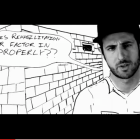
Benjamin Chambers On the School-to-Prison Pipeline
|
How do you reduce the number of kids going into the juvenile justice system? Overhaul school disciplinary policies. Here's a quick overview of research on the problem, a great video that puts a human face on the issue in Connecticut, and some things you can do. Just yesterday, the Council of State Governments Justice Center released Breaking Schools’ Rules: A Statewide Study of How School Discipline Relates to Students’ Success and Juvenile Justice Involvement. The report is based on a groundbreaking study of nearly 1 million secondary school students in Texas.


